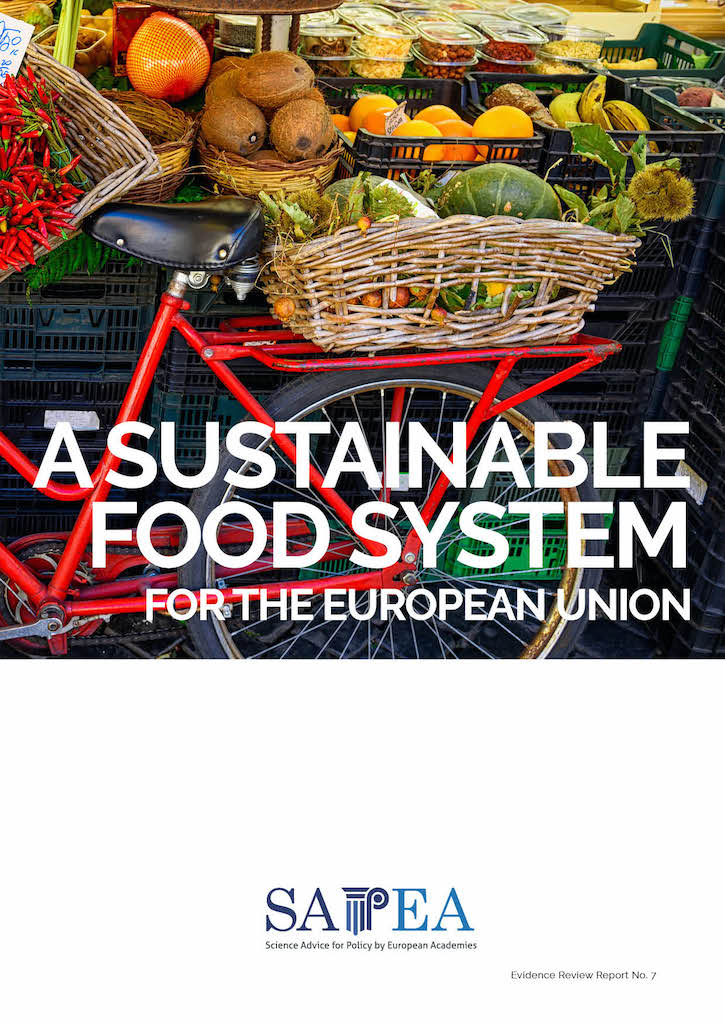The present EU food system provides a high level of food security, food safety and wide consumer choice. Its environmental, economic and social sustainability are by contrast poor. Maintaining ‘business as usual’ will endanger natural resources, our health, the climate, and the economy.
The scientific opinion by the SAPEA (Science Advice for Policy by European Academies) consortium published in March 2020 (62 pages) provides advice on how to achieve a sustainable food system.
The Farm2Fork Strategy aims to promote sustainable food systems by setting concrete targets and establishing an Action plan, annexed to the F2F Strategy. This creates the framework for a real debate on the future of food systems, leading to a legislative proposal for sustainable food systems by 2023.
This webinar will bring together 30 organisations participating in the work of the EU Food Policy Coalition with Dr Jeroen Candel, a member of the working group which wrote the SAPEA evidence review report. Together, they will discuss how closely the published Farm2Fork Strategy follows the scientific evidence, and which elements and approaches will be best to achieve food systems transformation.
This webinar will be co-hosted by the new EU Food Policy Coalition. Public participation is not available for this webinar.
Lead speakers
Dr Jeroen Candel, Wageningen University
- It recommends making environmental, social and economic sustainability the central objective of all policies relevant to food, in which ‘food’ is viewed more as a common good than a commodity.
- It calls on the European Commission to: be the engine that drives change in the EU and beyond, taking an active, step-wise and fully integrated approach; address power and information asymmetries in the food system and support a food environment that helps citizens to make sustainable choices; use a well-balanced policy mix in an iterative, responsive and adaptive manner, considering binding policy measures as the main drivers.
FIT4FOOD2030 Policy brief 1:
A systems approach is essential to transform the food system.
A systems approach is essential to transform the food system.
Read the policy brief #1 to understand why we need to strengthen the systems approach to Research and Innovation (R&I) in order to inform policy and decision makers to foster the transformation of EU food systems, in line with societies’ needs. (This policy brief is a revised and updated version of policy brief 1,
published in October 2018).
FIT4FOOD2030 Webinar 4:
RRI in policy making for future proof food systems
14 July 2020. The FIT4FOOD2030 webinar 4 touched upon the place of Responsible Research and Innovation (RRI) in policy making with the objective of achieving a sustainable food system in the EU. Visit this page to see the recordings of the webinar.
14 July 2020. The FIT4FOOD2030 webinar 4 touched upon the place of Responsible Research and Innovation (RRI) in policy making with the objective of achieving a sustainable food system in the EU. Visit this page to see the recordings of the webinar.
Previous webinars:
Upcoming webinar:
4 September 2020 at 14:00 (CEST)
The EU’s Farm2Fork strategy Register by invitation onlyThe Farm2Fork Strategy aims to promote sustainable food systems by setting concrete targets and establishing an Action plan, annexed to the F2F Strategy. This creates the framework for a real debate on the future of food systems, leading to a legislative proposal for sustainable food systems by 2023.
This webinar will bring together 30 organisations participating in the work of the EU Food Policy Coalition with Dr Jeroen Candel, a member of the working group which wrote the SAPEA evidence review report. Together, they will discuss how closely the published Farm2Fork Strategy follows the scientific evidence, and which elements and approaches will be best to achieve food systems transformation.
This webinar will be co-hosted by the new EU Food Policy Coalition. Public participation is not available for this webinar.
Lead speakers
Dr Jeroen Candel, Wageningen University
Related:
A sustainable food system for the European Union (224 pages)- The global demand for food will increase in the future. To meet this demand, it is not enough simply to increase productivity in a sustainable way. We also need to change from linear mass consumption to a more circular economy — which will mean changing our norms, habits and routines.
- The evidence shows that this kind of behaviour change needs to happen collectively, not just individually. So we need joined-up governance at local, national and international levels.
- Food systems also contribute significantly to greenhouse gas emissions. This can be addressed by reducing waste or directing it back into the supply chain.
- A mix of different measures will be most effective. The evidence shows that taxation is one of the most effective ways to modify behaviour. Accreditation and labelling schemes can also have an impact.
- Meanwhile, reform of European agriculture and fisheries policies offer great opportunities to develop resilience and sustainability.
- But there is not yet enough evidence to know for sure exactly what works in practice, so the steps we take should be carefully evaluated, and trade-offs anticipated.



No comments:
Post a Comment